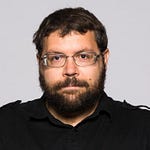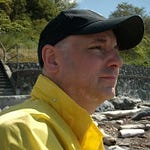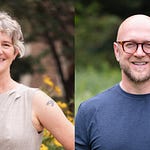If you haven’t visited yet, there are new posts every Tuesday and Friday. Check out my essay on the reality show “Alone” and ’s post “When Will Passing Become Passé?” from last week.
Episode 3 Transcript
Joshua Doležal
I’m Joshua Doležal, and this is Catchment, the podcast for The Recovering Academic Substack series. My guest today is Dr. Kevin McClure.
I found Kevin’s work in The Chronicle of Higher Education around the time that I began my own series on the state of academe. He was one of the voices that helped me feel that my concerns about higher education were valid, that the problems were real, and that the current state of affairs at many colleges and universities is unsustainable.
Kevin McClure
Ultimately, disengagement is about to what extent do we feel like we have a meaningful shared project that can create kind of a value proposition for being physically present and connected with one another. My concern more so now than where, for example, faculty are at is what are institutions doing about it? Or, more pointedly, what are they continuing to not do about it?
Joshua Doležal
Kevin McClure is the Murphy Distinguished Scholar of Education and Associate Professor of Higher Education at the University of North Carolina Wilmington. His research focuses on college finance, management, and leadership, and he writes regular columns for The Chronicle and the website EdSurge. While you might be wondering why I’m interviewing someone so securely established within the Academy, it’s because Kevin and I speak the same language about what is broken in higher education. And he has some interesting ideas about what might be done to fix it.
This is the third episode of Catchment. Today, in addition to the full episode for paying subscribers, I’m sharing a free sample of my conversation with Kevin. To hear the full interview, you can upgrade your subscription at joshuadolezal dot substack dot com, slash subscribe. Or just click on the subscribe button in the podcast transcript. Your support allows me to pay my podcast guests a modest stipend. It also gives you access to my full archive and subscriber-only content, like stories for The Chronicle, private discussion threads on Fridays, and literary work that I share throughout the year. I look forward to welcoming you to The Recovering Academic community.
Now back to my conversation with Kevin McClure.
Joshua Doležal
As I've asked a lot of guests, what was it that pulled you into academe? Probably against all practical advice.
Kevin McClure
Yeah, it's interesting because and first of all, thank you for the invitation and really glad to be here and glad to be part of this conversation. My path into the faculty world was, I have to say, not exactly planned, which can sometimes frustrate people as I tell this story, so I hope that if that's the case for you Please know that I'm aware that this can be a somewhat frustrating experience. But I entered into a Ph.D. program because I had been effectively bumped out of a staff job that I had at a university because they decided that they wanted to have a faculty person direct the program that I had been leading for several years. I had always had an inkling that I wanted to go back to pursue my Ph.D., but that was really kind of the clear signal to me that within the world of higher education, having that degree was going to matter and I wanted to have more options available to me.
Joshua Doležal
Thinking way back to when you were a kid and you know there probably are few of us that ever think, oh, when I grew up, I want to be a professor, but you might have had family members who had gone to college or maybe even some that had been professors? When did you think about higher ed as a place that you'd want to work even before that staff position? Maybe the paths that led up to that through undergrad or even earlier.
Kevin McClure
So, zero inkling of higher education as a career path, zero sense of what it was that professors did growing up. My dad was in the military and then did work in communications and my mom was a public special education teacher for 30 years and so. College was on our radar but was not a regular kind of topic of conversation and probably didn't step foot on a college campus until my sister started looking. The way that I got into higher education work is that I was heavily involved in leadership as an undergraduate student. I was a resident assistant for pretty much the entire time that I was in college, including through summers and over the summers at my small liberal arts college, would work in our housing office. I would work in the Dean's Office and through that it became clear to me that there are in fact jobs that people do at colleges and universities. But my focus at that point in time was not on a faculty job. When I graduated from my undergraduate program, I went directly into a master’s program to prepare for a career in student affairs. And so that's that was my entry point into higher ed work. I worked in residence halls. As you noted, I started a staff job in a global studies program and it was at that point that I then started thinking about going back for my Ph.D.
Joshua Doležal
Well, so I'm curious. Your father in the military and your mother being a public school teacher -- both of those are careers that have a deep service ethic built into them, so it doesn't seem like you grew up in a family that was foremost concerned about money or pushing you into high earning careers. It was more about the purpose question. You know are you helping others or are you being useful? Is that fair to say?
Kevin McClure
Yeah, 100%. I, you know, my parents were lovely about not pressuring me around my college choice, not pressuring me around my choice of major. You know, looking back on it now as a parent, I say, you know, they might have pressured me like a little bit more, you know, or if nothing else, just like offered some possibilities. But really they kind of let me choose and I chose based on what I thought was going to be best for me and the best opportunity to learn. And I don't regret the decisions that I made, but it was definitely the case that I didn't come from a family where the emphasis was purely on college to get a job, to get to earn a certain amount.
Joshua Doležal
So having been in leadership, having been engaged with campus life, you didn't want that to end after four years. And so you followed that into…was that into the global studies position or did you have sort of a few stepping stones before that?
Kevin McClure
A few stepping stones. You know, I did a graduate assistantship, so I was working at the institution where I was pursuing my master’s degree. So for the three years that I was leading that program, my office was located in the residence hall. I was intimately involved in the lives of the students in terms of housing them and roommate conflicts, but also programming. I did a little bit of teaching through that. As much as I say perhaps that I was entirely clueless as I went into the faculty world it's probably fairer to say that, unbeknownst to me there I had been building a bit of a foundation that pointed me in that direction, but as I got into my faculty job search, well, I can't even call it a faculty job search. I was applying for jobs largely in either higher education administration or education policy and was probably 50 or so applications deep before I put my hat or put my name in the hat for a faculty job. I ended up applying for two faculty jobs, and so this is the part where people get frustrated because I ended up getting one of those and literally upon learning that I had an on campus interview had to meet with a mentor at my Ph.D. institution and say, “I don't know what I'm doing. Help me. What am I about to walk into?” I didn't know what the interview process was going to look like because faculty interviews look different and have different components compared to kind of staff interviews and so had to get kind of a crash course in the faculty interview process. But B, you know what things that I ought to be thinking about and asking about and the type of institution that I was going to be walking into because I was going to be interviewing at a regional public university and at that point had only had my experience at a liberal arts college and the research university where I had been working.
Joshua Doležal
And that's the position you still have.
Kevin McClure
That's the position I still have. Be, you know, nine years this summer.
Joshua Doležal
Well, Congrats. I mean, there's no point in wishing more suffering on you, right? To have found your way into academe. But as you’re telling your story, I'm thinking about how your perspective in the limited glimpse I've had of it -- I mean, there's nothing transactional really about education for you. There wasn't for you as a student. It was about meaning; it was about relationships. And so I assume that those things made it, even if you weren't prepared for the interview process, for a faculty position, that's the foundation that you would need to be speaking the language of faculty. I don't know if you've reflected on that in hindsight.
Kevin McClure
Part of it was I walked into faculty life already with a very, very deep commitment to building relationships with students. So my work up until that point had been working intensively to build community amongst a group of 70 or so undergraduate students and so you know the idea of giving and educating and building community. I would like to think those are some of the cornerstones of faculty life, and so it made that type of transition a little bit easier. You know, the other dimension of it, honestly, is that it's deeply humbling to walk into a job for which you feel so ill prepared. And so I probably had a little bit -- well, I definitely had imposter syndrome. 100%, no doubt about it. So that some of the transactional-ness dials back a little bit when you're like, who am I to be asking anything of this? I was so glad to have a job and even one for which I felt very behind the curve. And so I walked in very much with a posture of trying to learn and figure out whether or not this was something I was going to be able to do and I think that helps to put you in a position to try to make the most of it rather than kind of walk into it and say “how can I leverage this place so that I can move as quickly as possible” --that was never, never really the logic that I brought to it.
Joshua Doležal
Well, you seem like a really upbeat person and I would guess you're kind of an optimist at heart, but you know, we came together because of a crisis. We both were responding to this from different vantage points. And I think you've said that you noticed at a certain point that something was off in a higher ed. What was that? What were you seeing? Was there a moment? Was it a process? How did you know that you needed to look further into this?
Kevin McClure
I mean, I think the sense that something was off was probably there at a very early point. The dissertation that I wrote, for example, was on the concept of academic capitalism in higher ed. So I had been studying privatization and the consequences of privatization and higher ed from the very get go. So on that level, I had already started to see things like kind of increasingly managerial approaches and the undermining of shared governance and power dynamics, and how it kind of erodes the voice of staff members. Some of those things were already clear to me, even walking into my faculty job as a faculty member, you know pre tenure. As I was trying to figure things, you know, I had two kids. My dad passed away and there was a moment within my department where I kind of looked around and all I saw was exhaustion. Everybody was exhausted. Everybody was spread thin, everyone was overtaxed and there was some underlying toxicity within the department, but the thing is, that the toxicity often flowed from people being exhausted. And what I know now that I didn't know then is one of the less talked about aspects of burnout is actually not being able to feel like you've got meaningful connection with your colleagues.













